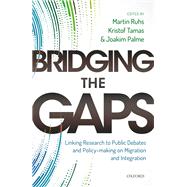Bridging the Gaps Linking Research to Public Debates and Policy Making on Migration and Integration
, by Ruhs, Martin; Tamas, Kristof; Palme, Joakim- ISBN: 9780198834557 | 0198834551
- Cover: Hardcover
- Copyright: 5/28/2019
What is the use of research in public debates and policy-making on immigration and integration? Why are there such large gaps between migration debates and migration realities, and how can they be reduced? Bridging the Gaps: Linking Research to Public Debates and Policy Making on Migration and Integration provides a unique set of testimonies and analyses of these questions by researchers and policy experts who have been deeply involved in attempts to link social science research to public policies.
Bridging the Gaps argues that we must go beyond the prevailing focus on the research-policy nexus by considering how the media, public opinion, and other dimensions of public debates can interact with research and policy-processes. The chapters provide theoretical analyses and personal assessments of the successes and failures of past efforts to link research to public debates and policy-making on migration and integration in six different countries - Germany, the Netherlands, Norway, Sweden, the United Kingdom, and the United States - as well as in European and global governance debates. Contrary to common public perceptions and political demands, Bridging the Gaps argues that all actors contributing to research, public debates, and policy-making should recognize that migration, integration, and related decision-making are highly complex issues, and that there are no quick fixes to what are often enduring policy dilemmas. When the different actors understand and appreciate each other's primary aims and constraints, such common understandings can pave the way for improved policy-making processes and better public policies that deal more effectively with the real challenges of migration and integration
Bridging the Gaps argues that we must go beyond the prevailing focus on the research-policy nexus by considering how the media, public opinion, and other dimensions of public debates can interact with research and policy-processes. The chapters provide theoretical analyses and personal assessments of the successes and failures of past efforts to link research to public debates and policy-making on migration and integration in six different countries - Germany, the Netherlands, Norway, Sweden, the United Kingdom, and the United States - as well as in European and global governance debates. Contrary to common public perceptions and political demands, Bridging the Gaps argues that all actors contributing to research, public debates, and policy-making should recognize that migration, integration, and related decision-making are highly complex issues, and that there are no quick fixes to what are often enduring policy dilemmas. When the different actors understand and appreciate each other's primary aims and constraints, such common understandings can pave the way for improved policy-making processes and better public policies that deal more effectively with the real challenges of migration and integration







